[Fantasy Review] Wheel of Time 1, 2, 3, Tigana, Good Omens, Small Gods
- 17 minute readHere are the my thoughts and reviews for a selection of fantasy novels I recently read through.
1. Book One of The Wheel of Time: Eye of the World by Robert Jordan - 1990
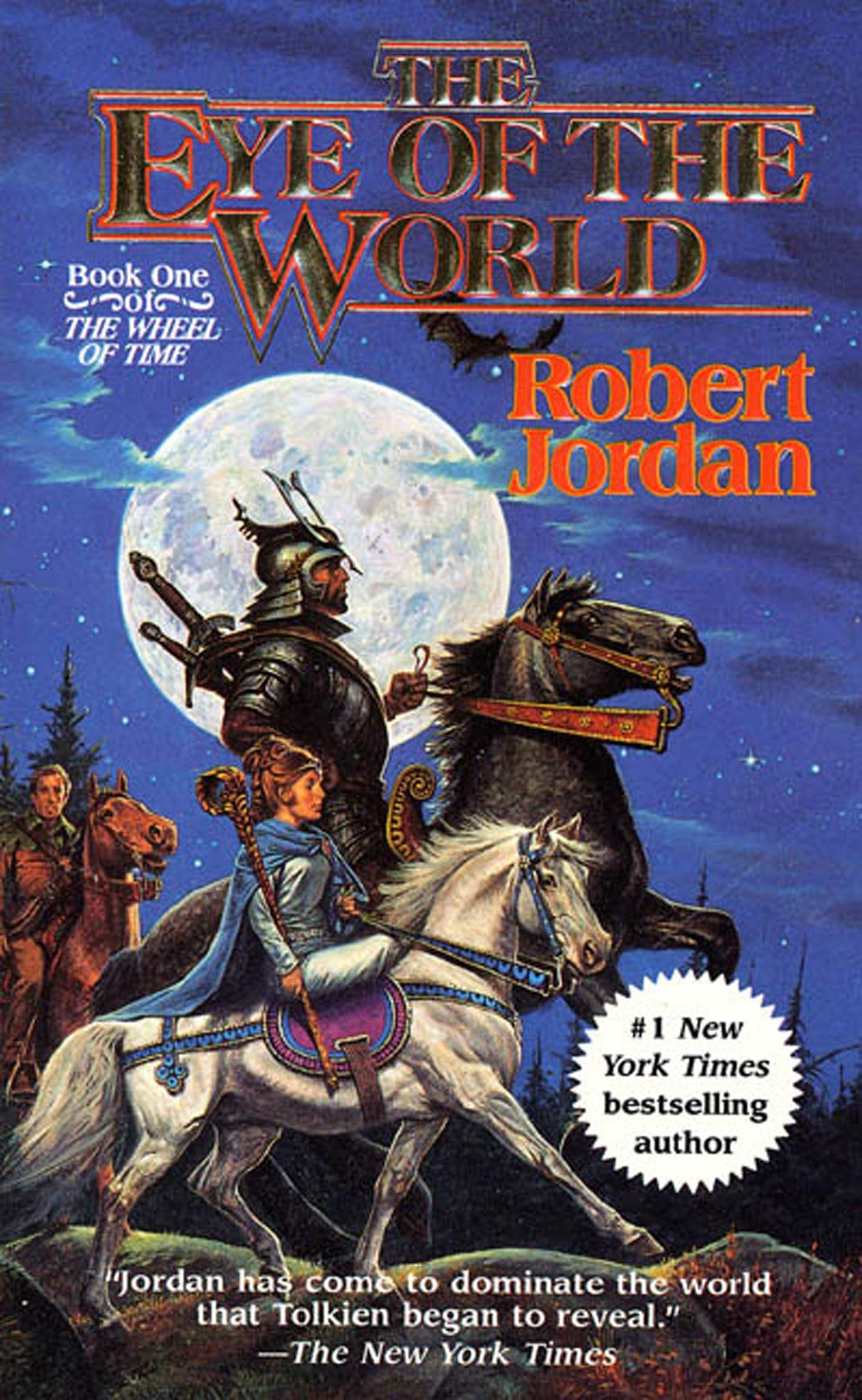 The first book on the list is The Eye of the World, Book One of the Wheel of Time series by Robert Jordan.
The first book on the list is The Eye of the World, Book One of the Wheel of Time series by Robert Jordan.
Overview and opinion [non-spoilers]:
The plot follows a group of young villagers from a rural countryside as they learn of an evil unfolding across the land and of their greater significance in the world. It is easy to liken the beginning of this story to the start of Lord of the Rings, but it sounds like this was intentional by Robert Jordan as a way to start the reader off on familiar grounds during a time when Tolkein-esque fantasy was abundant. After the first act, the book diverges greatly from LotR and continues on its own direction.
What’s interesting to me about this series from the outset is that throughout the book there are hints at a grand vision of a plotline, and the author teases just enough mystery and threads to inspire me to continue with the series. The worldbuilding is also very convincing and flush with detail. These points are enough for me to be able to recommend this to others looking to start a fantasy epic with deliberate writing and depth.
Other notes [Spoilers]:
- Aes Sedai - I found the wizards of this land very intriguing. The Aes Sedai Moraine, along with her companion, Lan, kept my interest throughout the book. Jordan kept the younger characters of this naive and impressionable, which I assumed was a deliberate decision to give them room to grow. So I appreciated all the interactions with Moraine as that’s where we get a lot of the hints of the greater plot in the world. Gandalf is one of my favorite characters from Lord of the Rings for this same reason, so I’ll never tire of characters similar to him.
- Naming Conventions - The consistency and novelty of the naming convention in this world is another hint at the capability of the author. This along with the clothing and hair detail contribute to a land that is both foreign and familiar at the same time, and I’d call that a success in a fantasy world.
- Dreams - I’ve got to be honest, I’m not actually a fan of the use of dreams as a plot device, and Jordan happens to use it very regularly. I do appreciate it being used to hint at a bigger, more complex plot, but it’s jarring to be pulled out of the action so often.
- The Green Man - I really liked the concept of the Green Man and the imagery and lore surrounding him. He is hinted at early in the book and is finally met later on.
- Shagar Logoth - This city, along with the Green Man, make me appreciate Jordan’s ability to introduce and build upon a concept. Logic and consistency are important, and I feel that Jordan excels at this.
- Thom - Another excellent introduction. It feels like there is more to this character than the author is initially letting up at this point in the story, and it’s another point in favor of Jordan’s ability to introduce a story thread and then build upon it with care.
2. Book Two of The Wheel of Time: The Great Hunt, by Robert Jordan - 1990
 Overview and opinion [non-spoilers]:
Overview and opinion [non-spoilers]:
The pacing and style of book two takes a decidedly different approach than book one, in a good way. I enjoyed the familiarity of the characters and I felt like some of them made some interesting growth by the end of this book.
Other notes [spoilers]:
- Flicker - Chapter 37: What Might Be. This chapter officially sold me on this series. It was compelling, well-written, and the implications it set up for Rand and the world really helped me understand what was at stake here and the gravity behind the main characters’ actions.
- Ingtar - Ingtar’s entire plot was fantastic and so far it’s some of the better writing of the series. I loved his story and his sacrifice and Rand’s final exchange with him.
- Parallel Universes - I’m a sucker for parallel universes in fiction and I’m loving Jordan’s approach to it. An enemy that can operate across dimensions and timelines is very interesting and it’s reassuring that Jordan seems to be spending the time to develop this kind of power level and, with 14 books, develop our main characters to be able to tackle it.
- Seanchan - This is another interesting enemy. With magic users and magic items, it makes sense to me that there would be humans that would attempt to enslave the magic users in some way. Also, exotic animals and dinosaurs! Egwene being caught up with the Seanchan was a great way to introduce these people and their threat. Egwene even gets a badass moment when she finally gets to retaliate against the Seanchan that enslaved her.
3. Good Omens by Terry Pratchett and Neil Gaiman - 1990
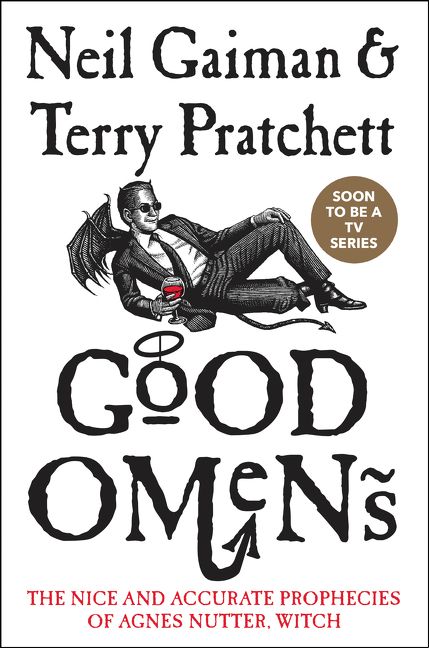 Overview and opinion:
Overview and opinion:
Good Omens is a comedy about the apocalypse and the birth of The Antichrist, who is accidentally switched at birth and given to a normal family. This causes problems for the coming of the End Times, and an angel from Heaven and a demon from Hell are sent to investigate. There are a few other subplots, including an appearance of the Four Horsemen, the last witch-finder in England, and a modern-day witch who is the heir to a book that is a collection prophecies that all happen to be true but too obscure and cryptic to be very useful.
I really enjoyed this book. It’s a fairly quick read, but it drips with the charm that Pratchett and Gaiman are so renown for. It’s thoughtful and witty, and manages to weave quite a few plotlines in an impressive sort of controlled chaos that I think these two authors are particularly well-suited to manage. I can’t wait to see the recent mini-series!
Other notes [spoilers]:
- Aziraphale and Crowley, Good and Evil - I loved the characterization that the authors put into these two, and I loved the way their relationship was developed throughout the book. It’s a perfect buddy-cop dramedy, with some greater exploration on the nature of angels and demons and of good and evil. I feel like there’s a lot to unpack here, so I think I may come back to these characters in a separate post in the future.
- Agnes Nutter - I loved everything about Agnes. Her premise is hilarious, and the way she goes out is pretty badass too.
4. Tigana by Guy Gavriel Kay - 1990
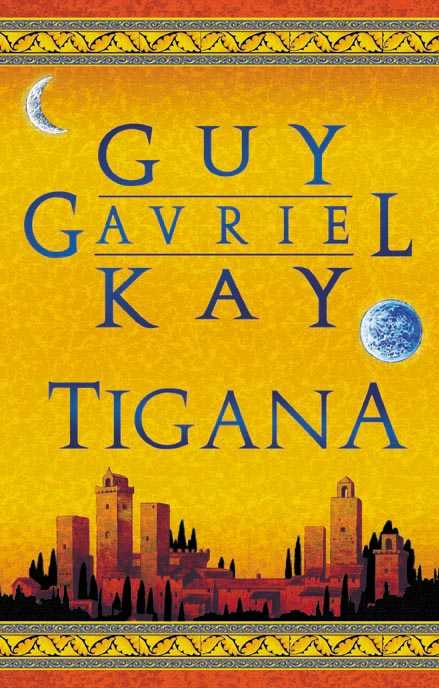 Overview and opinion [non-spoilers]:
Overview and opinion [non-spoilers]:
This is a standalone novel by author Guy Gavriel Kay. It takes place in a fantasy counterpart of medieval Italy, and features two conquerors occupying the peninsula. The story focuses on a band of rebels that are trying to liberate the peninsula. We also get the point of view of one of the conquerors, as well as a concubine of his.
Out of all the fantasy books I’ve read, on this list or otherwise, Tigana stands in a tier near the top. It features several believable and dimensioned characters, an engaging, gut-wrenching plot, interesting themes and premise, and, above all, its prose is spectacular and such a joy to read. This is a book that I will keep multiple copies on hand to give out as gifts. To fans of the fantasy genre or otherwise, this is a book worth reading. Based on this, I cannot wait to read the rest of Guy Gavriel Kay’s novels.
Other notes [spoilers]:
-
Themes
a. Memory - I’ll point out GGK’s own words on the theme of memory in this book:
“Tigana is in good part a novel about memory: the necessity of it, in cultural terms, and the dangers that come when it is too intense. Scelto’s decision at the end of the novel is a reflection of that, and so is the George Seferis passage that served as one of my epigraphs. The world today offers more than enough examples of both pitfalls: ignorance of history and its lessons, and the refusal to let the past be past.” - Guy Gavriel Kay, “Afterward”
He writes that he was inspired by a picture from Soviet-era Czechoslovakia, where a person in the photo was edited out.
b. Oppression - A constant running theme through the book, the people of Tigana spend much of the book overtly acting out against their oppressors, but they also do so behind closed doors as well:
“The novelist Milan Kundera fed my emerging theme of oppression and survival with his musings about the relationship between conquered peoples and an unstable sexuality: what I have called “the insurrections of night.” The underlying ideas, for me, had to do with how people rebel when they can’t rebel, how we behave when the world has lost its bearings, how shattered self-respect can ripple through to the most intimate levels of our lives.” - Guy Gavriel Kay, “Afterward”
Music and dance also play a big part in Tigana and its people as well, and as forms of expression it helps enunciate Tigana’s oppression.
c. Pride - The people of Tigana are above all, prideful. This pride drives much of the narrative, Tigana’s past, and many of the character arcs in the novel. It’s a beautiful exercise in both the power of and the failings of pride.
- The Tyrants - The novel revolves around the two tyrants aiming to conquer the peninsula, and through point of view chapters they are given some amazing characterization. a. Alberico - The insane tyrant, much like Caligula of Roman fame. He is cruel and sadistic and certainly the more evil of the two tyrants, Alberico acts as an interesting counter to Brandin. b. Brandin - Although Alberico could make any other tyrant look good, I came away from the novel feeling like Brandin was not actual evil. I’m a fan of morally-gray characters, and Brandin is probably one of the best Anti-Villain’s I’ve read. He is cultured, benevolent, and a great ruler. He is however also severely ruthless and unapologetically vengeful. I was constantly flipping back between being very afraid of Brandin and rooting for him.
- Dianora - Originally swearing to assassinate Brandin, she ends up falling in love with him. This sets up for a great character study, as there’s a lot to grapple surrounding Dianora, and I think she comes across as another intensely interesting and conflicting character. And that’s before we even count in her incest plotline.
- Binding Wizards - The rules for magic in this book are well done and compelling, and the ability to bind wizards is one of them. One of our heroes ends up doing it, which sets the story up to explore yet another morally grey subject. I love how we are given these systems of magic, and then left to ponder their implications.
- Riselka - I loved the mythology surrounding this book, especially the Riselka, which were based on the “rusalka” of Slavic folklore.
5. Reaper Man by Terry Pratchett - 1991
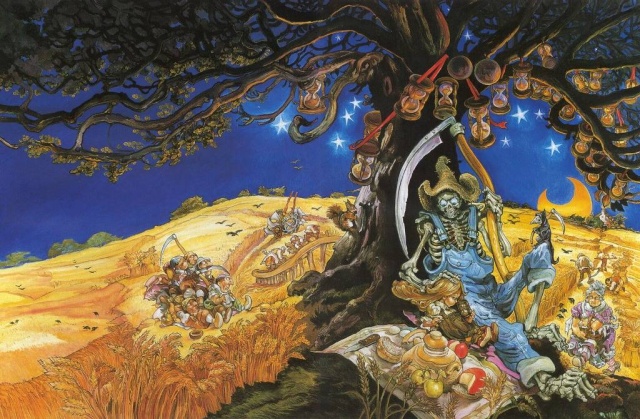 This was my fifth Terry Pratchett novel and it was by far the most emotionally impactful Discworld novel I’ve read. Pratchett masterfully spends the entire novel winding up for a knockout of a gut punch in the final moments of the novel. I was already a fan of the character Death, but Prachett’s characterization of him in this one has made the character an immediate favorite of mine. After Reaper Man, I really can’t wait to read another novel starring Death.
This was my fifth Terry Pratchett novel and it was by far the most emotionally impactful Discworld novel I’ve read. Pratchett masterfully spends the entire novel winding up for a knockout of a gut punch in the final moments of the novel. I was already a fan of the character Death, but Prachett’s characterization of him in this one has made the character an immediate favorite of mine. After Reaper Man, I really can’t wait to read another novel starring Death.
Other Notes [spoilers]:
- There are tons of awesome moments in this one. If you’ve read this, you’re probably expecting this, so of course the most poignant quote of the book is when Death confronts Azrael about Death’s need for compassion: “WHAT CAN THE HARVEST HOPE FOR, IF NOT FOR THE CARE OF THE REAPER MAN?” and then later, Azrael’s response, “YES”.
- And then when he brings Miss Flitworth chocolates and a diamond to be her friend, misinterpreting “diamonds are a girl’s best friend”.
- And finally, when Miss Flitworth dies, Death takes her into the past to see the man she loved, I just completely lost it.
- Above all, I just loved all the little characterizations of Death that we get throughout the novel. Like when he has to kill the chicken or the rats, he thinks about how he’s never actually killed anything, only transported life away when it was time. Or how he gets confused when they’re going to have chicken for dinner, “BUT WE FEED THEM.”
- Contrast with the New Death: The part where Death gets angry at the other Death for wearing a crown is awesome. Death doesn’t view himself as a ruler so much as one with a necessary job. This whole sequence is great,
-
Comfort in Death: When Death is racing against the Combination Harvester, John Henry-style, he cuts each stalk individually. Perhaps this emphasizes the way Death sees the individuality in life, which is later further highlighted against the New Death, and goes back to the “what can the harvest hope for” quote.
I feel like Pratchett takes an incredibly comforting stance on Death in this novel. When he goes to the Death of the Universe, he makes the argument that we mortals deserve consideration. Like a harvest, our lives are the product of hard work, time, and effort. Each of our individual lives have an end result worth valuing. To me, this is the main message of the book, and I thank Terry Pratchett for making death just a little less fearful.
- And finally, something about Death creating fields of corn back at his domain, “alive, whispering in the breeze” just really brings this amazing book altogether.
6. Book 3 of The Wheel of Time: The Dragon Reborn by Robert Jordan - 1991
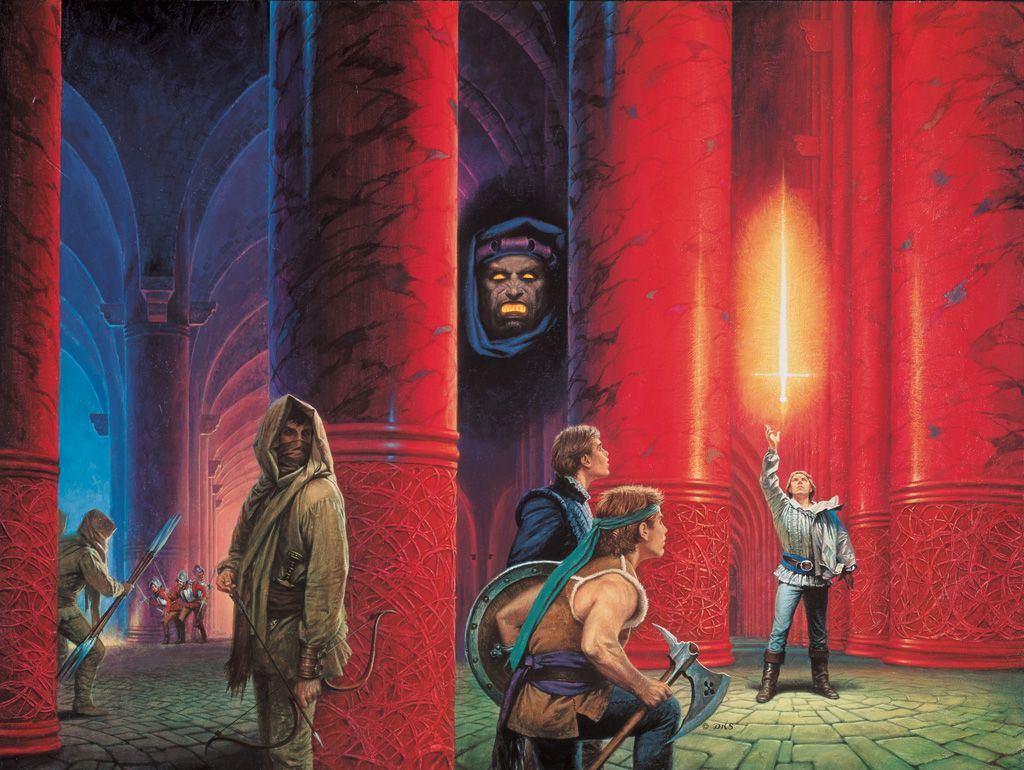 Overview and opinion [non-spoilers]
Overview and opinion [non-spoilers]
Jordan has a great ability for setting up multiple concurrent plot threads and then bringing them together in a climactic finale. This is more-or-less present in the first two books of The Wheel of Time, but with book three he makes it a pattern, and a very satisfying and exciting one at that. It took until this point in the series, but I am now very excited to continue this story and see where Jordan takes these characters.
Specifics [spoilers]
- Ter’angreal - Jordan continues to knock it out with introducing and expanding on fantastical elements. The ter’angreal and sa’angreal are just another on the list of cool things that are at play in this world. It was exciting learning about these devices, as I immediately thought of the other possible angreal that have been present in the story without us explicitly knowing about them, for example the three rings from The Great Hunt. It just adds to the feeling of this world and its elements have been meticulously planned, and the characters as well as the reader are slowly growing and learning about a world that has always been there. The same goes for the following:
- Magic System - The characters are learning more about the world’s magic from Tar Valon and Moraine. At this point of the story there are quite a few plot elements being woven around each other, but Jordan has done an excellent job of making it feel like these forces have been at play since long before Book One. It’s an excellent exercise in immersion.
- Mat Cauthon - Mat is finally in on the action and it feels like a whole new character has been introduced. I loved journeying with Mat around the world, and his travel companion, Thom, was a welcome bonus! Pairing up characters in different ways is a really fun storytelling device for me and I love that Jordan seems to be taking this approach for exploring his characters.
- Dreams - I was initially put off by the use of heavy use of dreams in this series, but in this book it is revealed that dreams are a more interesting mechanic than I could have realized. It turns out that there is actually a world of dreams, the Tel’aran’rhiod, and there are certain people gifted with the ability to enter the dream world in their sleep. I love that Egwene learns about this and explores it throughout this book, as it also helps explain a lot of what Perrin and Rand have been going through in the previous two books.
7. Small Gods by Terry Pratchett - 1991
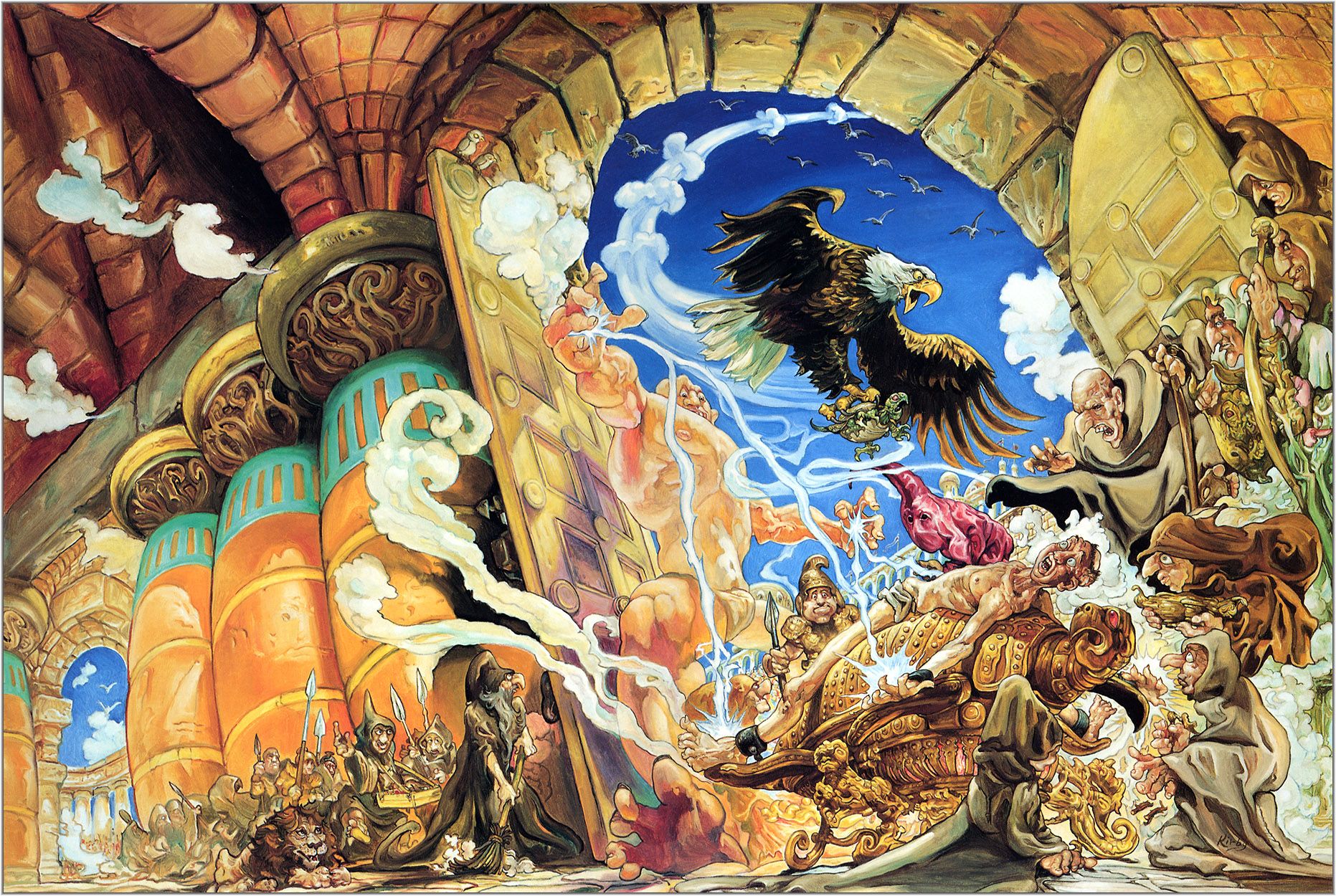 Overview and opinion [non-spoilers]
Overview and opinion [non-spoilers]
Yet another knock-out book by Sir Terry Pratchett. This one takes on the trope that the power of a god is proportional to the amount of belief in them. It features the “Great God Om”, who has been manifested in a turtle, reduced to such a state because everyone in Omnia obeys and fears the structure of the church of Omnianism rather than Om himself. Pratchett once again has very wise insights into the concepts of religion, the church, and humanity. I am generally a secular person, and I feel that maybe Pratchett resonates with me so strongly because he still manages to inspire these strong parables for life despite not being in a biblical format. Hell by the end of all this I’ll likely find myself preaching many of the lessons from these books.
Other notes [spoilers]:
- The founding rules of Brutha’s religion are fantastic - “In a hundred years, we’ll all be dead, but HERE AND NOW, WE ARE ALIVE.” Definitely worth preaching this one alone.
- Vorbis gets quite a fitting end to his story, and even a nice little slight from Death: Death: You have perhaps heard the phrase that Hell is other people? Vorbis: Yes. Yes, of course. Death: In time, you will learn that it is wrong.
- And then, when Brutha dies, he finds Vorbis, huddled and cowering, all alone in his own desert. But then we get an amazing moment from Brutha when he takes Vorbis by the hand and they walk together beyond the desert.
- I also loved how Vorbis’ “superpower” or triumph was to change others to be more like him, yet in all their time together, Brutha never lost his morality. In fact, Brutha actually picked up some of Vorbis’ other traits that would eventually help him go on to be a great leader, like confidence and charisma.
- I’m excited to see how the religion of Brutha ends up doing in some of the Discworld novels that take place after this one!
